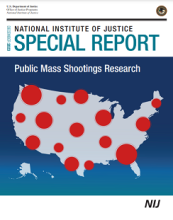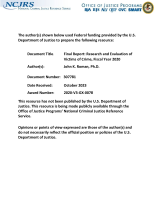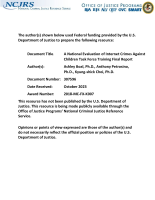Evaluation
Evaluation of Culture and Climate Effects in the Virginia Department of Corrections Cognitive Communities
A Mixed Method Evaluation of the Role of Religion in Desistance and Reentry
NIJ Special Report: Public Mass Shootings Research
Broadband Communications Prioritization and Interoperability Guidance for Law Enforcement
Does Scientific Evidence Support the Widespread Use of SQFs as a Proactive Policing Strategy?
Multidisciplinary Perspectives on the Implementation of a Comprehensive Sexual Assault Telehealth Program in Rural Communities: A Qualitative Study
Long-Term Arrest and School Outcomes of the Philadelphia Police School Diversion Program
Evaluation of Missing Data Imputation Methods for Human Osteometric Measurements
Evaluation of the long-term stability of select phenylacetylindole, cycloalkylindole, quinolinyl, and carboxamide synthetic cannabinoids using LC–MS/MS
Revalidation of the First Step Act Risk Assessment: A Test of Predictive Strength, Dynamic Validity, and Racial/Ethnic Neutrality
Applying an empirically derived effect size distribution to benchmark the practical magnitude of interventions to reduce recidivism in the USA
Validation of a Confirmatory Proteomic Mass Spectrometry Body Fluid Assay
Advances in Chemical Sorting of Commingled Remains
Evaluation of Uncertainty in Direct Measurement for Parameterization of Pyrolysis Models, Part I: Thermal Analysis
Results from an effectiveness evaluation of anti-bias training on police behavior and public perceptions of discrimination
NIJ FY24 Domestic Radicalization and Violent Extremism Research Center of Excellence
Comparison of Examiner Conclusions with Score-based Likelihood Ratios for Cartridge Case Evidence
Enhancing Vocational Training in Corrections: A Type 1 Hybrid Randomized Controlled Trial Protocol for Evaluating Virtual Reality Job Interview Training Among Returning Citizens Preparing for Community Re-entry
Implementation preparation costs of virtual reality job interview training in prisons: A budget impact analysis
"Even Through Text, there is that Connection": User Experiences on Chat and Text Hotlines for Intimate Partner Violence and Sexual Assault
Webinar: NIJ Research Assistantship Program Informational Webinar
This recorded webinar, originally held September 28, 2023, provides information on NIJ’s Research Assistantship Program, which offers highly qualified doctoral students the opportunity to bring their expertise to NIJ to work across offices and program areas to obtain a practical and applied research experience. The program is a research focused professional development opportunity for doctoral students from all academic disciplines. NIJ provides funds to participating universities to pay salaries and other costs associated with research assistants who work on NIJ research activities.
See the YouTube Terms of Service and Google Privacy Policy





